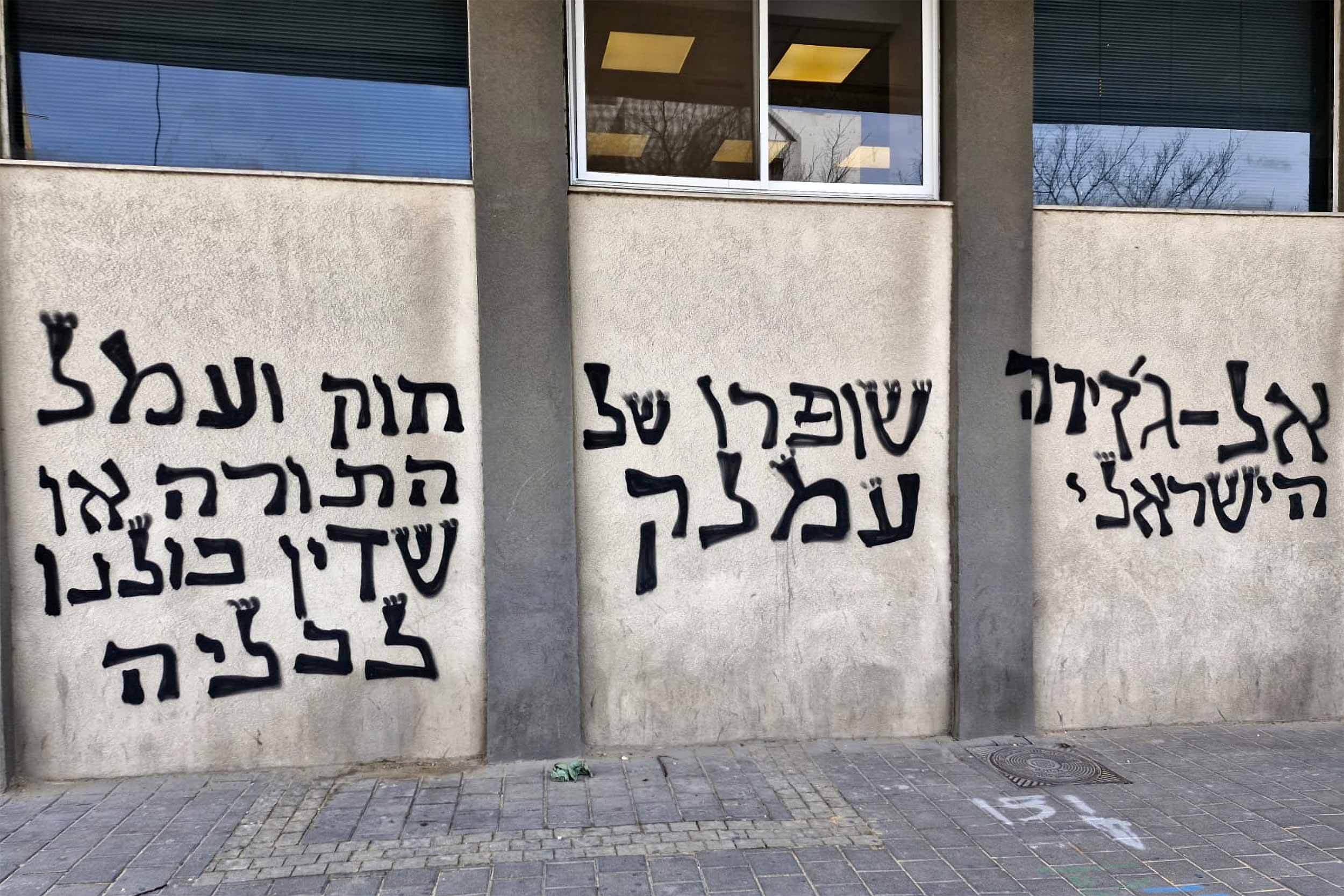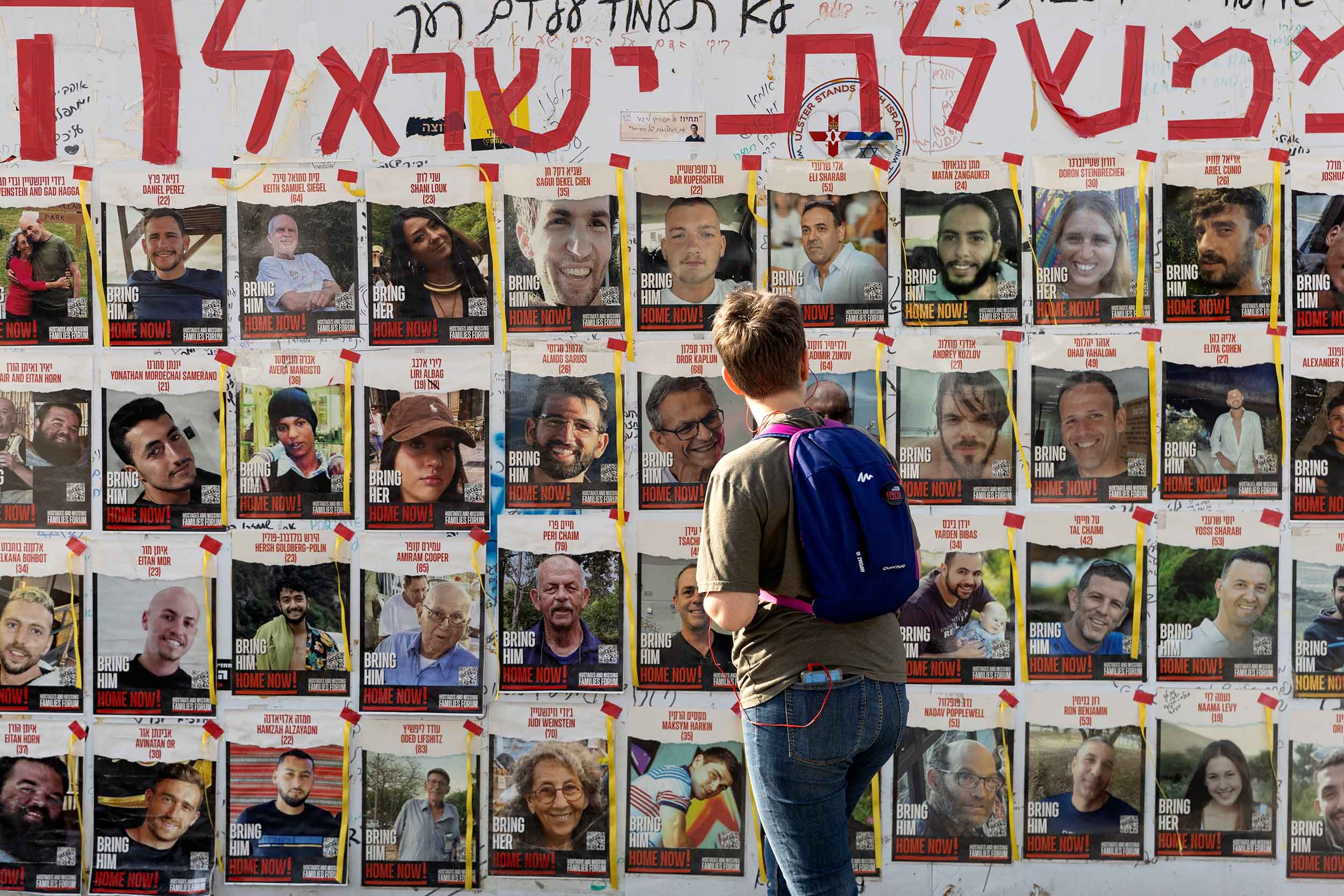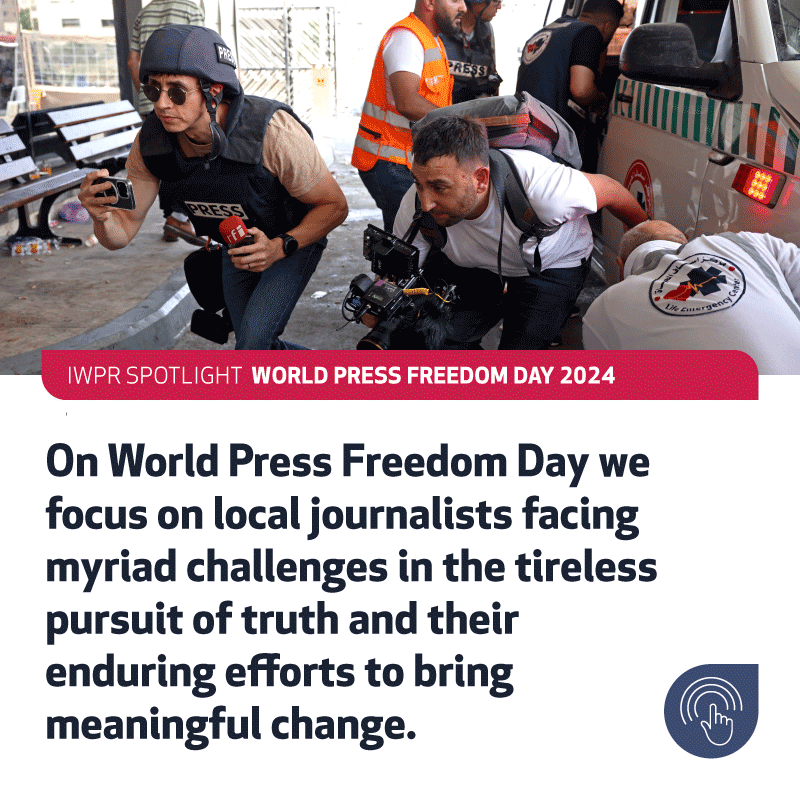Israel’s Media Blindness Over Gaza
Why there’s such a gap between what Israelis and the rest of the world see on their TV screens and social media feeds.
Here are just a few snapshots of the state of freedom of expression in Israel during the Gaza war: A Palestinian academic who teaches at Jerusalem’s Hebrew University is arrested for making “statements against Zionism”. An Israeli photojournalist is attacked and beaten by a mob of 30 settlers. A young protester at a ceasefire demonstration is arrested for calling the far-right national security minister a “criminal.” A member of parliament narrowly avoids expulsion for supporting the case at The Hague accusing Israel of genocide. A law is passed allowing the government to ban Al Jazeera. Four Israeli journalists are killed by Hamas; around 100 journalists are killed by Israeli strikes in Gaza.
Both the local and international media have presented October 7 as a watershed of such magnitude for Israel and the Palestinians that it represents a total break with what went before. But subsequent months have also demonstrated a continuity of the Israeli government’s avowedly Orbanesque aims to suppress civil rights and free expression.
“Israel’s media has largely chosen to self-censor its coverage of Gaza.”
The Hamas attack so shocked Israelis’ fundamental assumptions that many are still stuck in that moment, not least because of the 1200 killed, the 133 hostages still held in Gaza, the 600 plus soldiers killed in combat and the 100,000 Israelis displaced from the south and north of the country.
The subsequent war has cost a hellish number of Palestinian lives, heading towards 35,000 (according to Hamas figures, which don’t differentiate between civilians and combatants). It has displaced over a million Gazans and caused an incipient famine, leading to widespread destruction in a territory the UN described as “unliveable” five years ago.
The war’s ripples have caused tumult for Israel’s foreign relations from the Gulf to the White House, potentially influencing the November US presidential elections. An ongoing case at the International Court of Justice (ICJ) accuses Israel of genocide, while senior officials may soon face war crimes warrants from the International Criminal Court. On the streets and campuses of Western cities, there are full-scale pro-Palestinian protests. Jewish communities have experienced a global surge in antisemitism not seen for decades.
This provides plenty of justification for the ‘complete break’ theory. But there are also grounds to query it.

Dysfunctional Democracy
In early 2023, soon after Benjamin Netanyahu cobbled together Israel’s most unholy government ever - a collage of far-right, racist theocrats and messianic annexationists - his justice minister announced a sweeping legislative programme aimed at annulling the independence of the judiciary. This sought to remake Israel’s already fragile, dysfunctional democracy to conform with the coalition’s deeply illiberal worldview.
The judiciary was the key target, but the government, and certainly the prime minister - whose legal woes were triggered by his obsessive desire to control the press - were happy to clamp down on independent media too.
The attack was multipronged: Attempts to place shills in key regulatory and broadcasting positions, blatant favouritism for the Newsmax-style TV channel that functioned as a government mouthpiece, and the ramping up of a poisonous social media ecosystem, tended by Netanyahu’s son Yair, that trolled and intimidated dissenters as ‘enemies of the people.’
“The Netanyahu government has an enduring intention to clamp down on civil society and free speech.”
Opposing the government was the largest, most sustained protest movement Israel had ever seen. The hundreds of thousands who took to the streets every weekend waved the flags of Israel and of liberal democracy, even if the Palestinian flag was far less welcome, together with the suggestion that Israel’s suppression of Palestinian civil rights would one day come home to roost.
Haaretz, Israel’s last surviving liberal newspaper, firmly tied its colours to the pro-democracy movement’s mast, as it has likewise stood against the occupation. For that we were harangued and slandered, but we were free to report at will.
Then came October 7. It was an extraordinarily challenging series of events to cover. Our own journalists (or their families) were fighting to survive in the kibbutzim under attack and when they went south to report. As a small, highly socially networked society, everyone was only a step or two away from knowing someone who had been killed or taken hostage.
And there was both a deluge and dearth of sources: the government and army seemed barely functional, there was a flood of raw footage from Hamas itself - livestreaming murders with go-pros on Telegram accounts and hijacked victims’ Facebook pages, desperate civilians calling up radio and TV stations to beg to be rescued, a constant surge of surreal social media posts and wild speculation.
“Becoming the leading global news story means becoming a magnet for politicisation, polarisation and disinformation.”
There were themes that would follow during the subsequent war in Gaza: there is no substitute for independent journalists on the ground; the visceral power of graphic images cannot be understated; and becoming the leading global news story means events become a magnet for politicisation, polarisation and disinformation.
Haaretz’s baptism of fire with global disinformation merchants came as part of an onslaught that Bellingcat founder Eliot Higgins said was “the worst I've ever seen, by a significant factor,” misrepresenting our reporting to serve denialist claims whitewashing Hamas of responsibility for murder and rape.

When the ground incursion began, Haaretz flagged how both Israel and Egypt closed outside media access to Gaza. We signed open letters calling for access, and wrote editorials decrying the rising death toll of Palestinian journalists.
In the meantime, we tasked our reporters with ties to and sources in Gaza to amplify the voices of Gazans of all ages and walks of life, trying to survive displacement, constant bereavement and looming famine - as our reporter summarised it, “If death doesn't come in an airstrike, hunger will bring it.”
For that work, as well as Haaretz’s constant effort to force the government to take responsibility both for the disastrous failures of October 7 as well as the lethal excesses of the war, the communications minister tried to disable us economically, accusing us of “disseminating lying, defeatist propaganda” in wartime. That’s the same minister who earlier in the war proposed emergency regulations that would permit the arrest of citizens, including journalists, deemed guilty of the intangible charge of “harming national morale.”
In the meantime, Israel’s media has largely chosen to self-censor its coverage of Gaza. There’s a huge gap between the visual diet of Jewish Israelis and what the rest of the world see on their TV screens and social media feeds. On mainstream media, Israelis are still barely exposed to what’s happening in Gaza.
Back in December, hosting our podcast, I spoke with Anat Saragusti, a remarkable journalist and peace activist. Saragusti presciently said, "The fact that Israeli audiences don't see images from Gaza means that journalists are not doing their jobs…We don't see the atrocities, the rubble, the destruction and the humanitarian crisis. The world sees something completely different…If we don't see what they are seeing, we won't be able to understand the growing sentiment against us. We need to deal with it."
That cognitive gap has only grown since. Allied with the pressure from the Netanyahu government on Arab and Jewish civil society within Israel who seek to highlight the suffering in Gaza and call for an end to the war, there is almost a perfect storm of protecting one’s own pain, wilful blindness and political intimidation.
One of these themes relates to the ‘everything changed’ contention: the shocking trauma of October 7 and subsequent military mobilisation. The other expresses the Netanyahu government’s enduring intention to clamp down on civil society and free speech; to control the narrative, often using its own no-holds barred trolls and messaging ecosystems, which throws the epithet “accomplices of Hamas” at dissenters.
That control would allow it to try and rehabilitate its parlous electoral position, claiming "total victory" is still within reach, while extending and deepening Israeli control over more of the West Bank as eyes are on Gaza.
Like in all aspects of covering this appalling conflict, two (or more) ideas can resonate at the same time. It is just one example of the sore need to engage with complexity instead of flattening, zero-sum certitudes for a war which has so vastly polarised public opinion in Israel and around the world.
Esther Solomon is editor-in-chief of Haaretz English edition.

